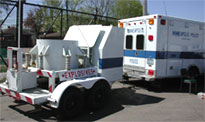Guest Post – February 21, 2018 Meuser Law Office, P.A. “Is My PTSD Still Compensable if Caused by Numerous Traumatic Events?”
 Under the Minnesota Worker’s Compensation Act, post-traumatic stress disorder (PTSD) may be characterized as a personal injury or as an occupational disease. Minn. Stat. §176.011, subd. 15(a). PTSD may develop as a result of exposure to a traumatic event or multiple traumatic events, which cause a person’s capacity to cope with stress to be overwhelmed and clinically disabling. Particularly in cases involving law enforcement or firefighters, a claimant’s PTSD diagnosis cannot be tied to one particular event; rather, each new traumatic event compound stress until the stress becomes psychologically and physiologically disabling.
Under the Minnesota Worker’s Compensation Act, post-traumatic stress disorder (PTSD) may be characterized as a personal injury or as an occupational disease. Minn. Stat. §176.011, subd. 15(a). PTSD may develop as a result of exposure to a traumatic event or multiple traumatic events, which cause a person’s capacity to cope with stress to be overwhelmed and clinically disabling. Particularly in cases involving law enforcement or firefighters, a claimant’s PTSD diagnosis cannot be tied to one particular event; rather, each new traumatic event compound stress until the stress becomes psychologically and physiologically disabling.
The Minnesota Workers’ Compensation Act defines PTSD as “the condition as described in the most recently published edition of the Diagnostic and Statistical Manual of Mental Disorders by the American Psychiatric Association.” Minn. Stat. 176,011, subd. 15(d). All the parties agree that the DSM-V is the most recently published edition of the DSM by the American Psychological Association. The statute requires psychiatrists, psychologists, and the court to use the DSM-V in determining whether an employee suffers from compensable PTSD.
The DSM-V explicitly states that PTSD may develop from an event or multiple events, noting that a person may witness “event(s)” as it occurs to others and “experiencing repeated” exposures, specifically citing police officers performing job duties involving witnessing repeated trauma to others. (DSM p. 271). Based upon the plain language of the DSM-V, examinees are not required to tie their symptoms to a single traumatic event. If this were the intention of the American Psychiatric Association, the authors would have written “traumatic event” and not “traumatic event(s).” (DSM-V at 271-72). Prong 4 under Criteria A of the DSM-V also demonstrates that medical professionals must examine multiple traumatic events. If an examinee qualifies only under the aversive details prong then they, by definition, would be referring to many or several incidents with regard to his or her symptoms listed in Criteria B-E because the fourth prong refers to repeated exposure.
Unfortunately, insurers use “independent psychological examiners” or “IPEs,” who are paid experts hired to find that you do not suffer from PTSD and if you do suffer from a psychological condition, the condition is not PTSD and is caused by non-work-related activities.
Typically, IPEs exclude employees from a PTSD diagnoses by attempting to circumvent the explicit text of the DSM-V by imposing additional requirements. An IPE’s personal interpretation of how physicians should diagnose PTSD is above and beyond what the Minnesota legislature requires in the statute as well as the actual authors of the DSM-V.
IPEs may use the CAP-5, a structure interview that mirrors the symptoms described in the DSM-5. Physicians use the CAPS-5 to track fluctuations in PTSD symptoms, for research and to determine if treatment is working. IPEs may limit the CAPS-5 interview is limited to several of an employee’s “worst” traumatic events and only inquire of symptoms within the past 30 days. The CAPS-5 has a few different versions, the lifetime and the “current” version, which examines reported symptoms within the past 30 days. The DSM-V does not limit reported symptoms to a set time frame, unlike the CAPS-5. (DSM-V at 271-280).
IPEs may also then creatively interpret psychometric testing to exclude claimants from a PTSD diagnosis. The MMPI-2 and the MMPI-2-RF are not diagnostic tools are not required by the DSM-V. As much as both the legal and scientific community would desire a brain scan or a blood test to check for PTSD or any other mental health disorder, that’s simply not possible. Additionally, the MMPI-2 is the only test that contains a scale specially tailored to examine the likelihood of PTSD; yet, IPEs may use the MMPI-2 RF that does not contain that scale.
If you believe you or someone you love suffers from work-related PTSD, contact the experienced attorneys at Meuser Law Office, P.A. for a free, no-obligation intensive case consultation. You may be entitled to thousands of dollars in benefits from PERA/MSRS, or under the Minnesota Workers’ Compensation Act. Call us today at 1-877-746-5680.




